Mindful Parenting: The Spiritual Essence of Attachment, An Interview With API Founders
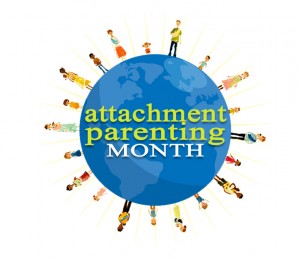 Join Kindred in celebrating Attachment Parenting Month in October 2015 with our exclusive interview with API founders, Lysa Parker and Barbara Nicholson, also authors of the book, Attached At The Heart. Nicholson and Parker talk with Kindred’s editor, Lisa Reagan, about mindful parenting as the spiritual essence of attachment science. Enjoy the audio download below as well as the edited transcript of this interview. The podcast was recorded as part of Lysa and Barbara’s LIVE Parenting As A Hero’s Journey virtual retreat this summer. You can join Lysa and Barbara for this now ON-DEMAND virtual retreat that explores the practical tools for the day to day spiritual practice of mindful parenting – a practice that builds a lifetime of connection and healthy attachment with partners and children.
Join Kindred in celebrating Attachment Parenting Month in October 2015 with our exclusive interview with API founders, Lysa Parker and Barbara Nicholson, also authors of the book, Attached At The Heart. Nicholson and Parker talk with Kindred’s editor, Lisa Reagan, about mindful parenting as the spiritual essence of attachment science. Enjoy the audio download below as well as the edited transcript of this interview. The podcast was recorded as part of Lysa and Barbara’s LIVE Parenting As A Hero’s Journey virtual retreat this summer. You can join Lysa and Barbara for this now ON-DEMAND virtual retreat that explores the practical tools for the day to day spiritual practice of mindful parenting – a practice that builds a lifetime of connection and healthy attachment with partners and children.
Listen and Download the Mindful Parenting: The Spiritual Essence of Attachment Discussion With API Founders, Lysa Parker and Barbara Nicholson
Mindful Parenting: The Spiritual Essence Of Attachment
A Thoughtful Discussion With API Founders, Barbara Nicholson and Lysa Parker
LISA REAGAN: I am very happy to have the opportunity to talk to you both about this connection that you’re making between mindfulness and attachment. Mindfulness, the idea of it, is becoming more popular in the United States, but not as understood as we would like for it to be yet. I saw a statistic the other day, about 28% of the population knows what it means – and I hope they’re not all in California. Mindfulness benefits are showing up in neuroscience research, but the connection between mindfulness, parenting, attachment science, and then you have put spiritual essence in your virtual retreat title. How are these concepts and practices interrelated? How is this understanding the frontier of conscious parenting?
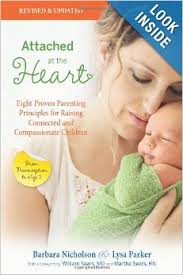
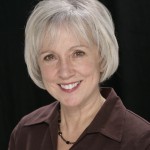 BARBARA NICHOLSON: Well, I just think of so many beautiful mentors that Lysa and I have had in our own parenting journey and the lesson that we learn and the reason that we call our book Attached at the Heart is that this wisdom of the heart is really what’s driving our intellect. It is what is driving our attunement with our babies, so learning about that innate wisdom that we have as parents was just a real life changing, empowering part of our parenting journey that became really important when we wrote our book and when we were developing our API support groups – to just tell parents our message is very simple: It’s about this attunement with our children and trusting our hearts.
BARBARA NICHOLSON: Well, I just think of so many beautiful mentors that Lysa and I have had in our own parenting journey and the lesson that we learn and the reason that we call our book Attached at the Heart is that this wisdom of the heart is really what’s driving our intellect. It is what is driving our attunement with our babies, so learning about that innate wisdom that we have as parents was just a real life changing, empowering part of our parenting journey that became really important when we wrote our book and when we were developing our API support groups – to just tell parents our message is very simple: It’s about this attunement with our children and trusting our hearts.
So mindfulness, meditation, consciousness raising, all of these terms are really talking about the same thing and it is just thrilling for us to be able to talk so openly about this joy that we have discovered through parenting our children, that it also helped us reparent ourselves and heal a lot of wounds from our own childhood stories and gave us a deeper understanding of our parent’s journeys and their parents. So it’s a beautiful spiritual connection to our elders that is really an enriching part of this whole journey. (Barbara is referring to their Parenting As A Hero’s Journey virtual retreat.)
LISA REAGAN: I have read your book and I can see in the Principle of Preparing, as you just now are talking about, what is one of the biggest pieces of preparation is this becoming aware of healing our own wounds and anyone, even people who aren’t on the path to parenthood just yet, there is a lot of information out there now about mindfulness as a way that we can discover self-awareness, self-regulation, especially when we are addressing trauma and trying to reprogram ourselves and our neurobiology to come into a place ofn- what were you saying- attunement, with our own being, with our own hearts.
BARBARA NICHOLSON: Being mindful, in the now, in that present moment is what our children are so brilliant at teaching us. They demand, especially our infants, demand that we be present and not distracted and really try to get inside what they’re needs are. So it is totally a spiritual practice.
 LYSA PARKER: As I watch my 2-year-old granddaughter, I see how “in the moment” she is at every moment and to be able to really get into that world with her is such a joy and I know that it probably wasn’t that way a lot of the times with my own two sons, just because when you’re a young parent, you’re just trying to get through the day. But I just remember that the more I learned about attachment parenting, as Barbara was saying, it demanded that I be present.
LYSA PARKER: As I watch my 2-year-old granddaughter, I see how “in the moment” she is at every moment and to be able to really get into that world with her is such a joy and I know that it probably wasn’t that way a lot of the times with my own two sons, just because when you’re a young parent, you’re just trying to get through the day. But I just remember that the more I learned about attachment parenting, as Barbara was saying, it demanded that I be present.
Now because you’re following your heart’s intuition, the wisdom of your heart, then you have to be present; and knowing the children are in that constant state up until the age of about 6, that they are in this theta brain frequency, which is for adults, the state of hypnosis. So their brains are just absorbing everything that they experience, everything that they hear and feel gets kind of downloaded into their conscious minds. So knowing all of that now, knowing the neuroscience, it behooves us to start paying attention.
It is not as people say airy-fairy or just this fad or trend that’s going on or some New Age trend. It is actually based in neuroscience. I think Dr. Dan Siegel is probably in the forefront of leading the charge in making people aware of mindfulness and being a neuroscientist himself at UCLA. He garners a lot of credibility and respect as an academic, but now he is doing sessions and trainings on mindfulness.
So it is just where East is meeting West. While it seems to be the worst of times, it is also the best of times, because these are all, in my opinion, indicators of this paradigm shift that we’re going through. We’re witnessing it and we’re in the throes of it and some of us are suffering and that suffering, whether it is suffering through being a parent or being a single parent, or an alone parent because you have a partner that is gone a lot. You know, it is forcing us to look at our internal resources and also reach out to people and build a network of support because we are finally waking up to discover that we aren’t supposed to do this alone. We are supposed to have a web of relationships to help us suffer the stormy seas of life. So that’s kind of a long response to your question, but those are the thoughts that come to mind. It is just a huge revolution and I am just excited and thrilled to be a part of it.
Connecting Mindfulness, Parenthood And Neuroscience
LISA REAGAN: I am too and at Kindred we talk about the weariness of parenting in this Space Between Stories. There was an Old Story, with its belief system of separation, and there is an emerging New Story and the New Story is about this connection and need for connection with ourselves and community and our children. This idea that we’re moving in between two stories together collectively, engineers some compassion for myself. I feel like I do not know what’s going and things are shifting so quickly, as you were saying. A lot of this change from a certain perspective can be considered positive. But on the other hand, shifing certainly does make for uneven ground for everyone.
LYSA PARKER: It sure does.
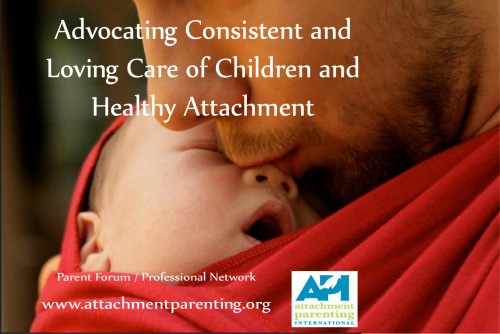 LISA REAGAN: I want to go deeper into the mindfulness piece. The reason I wanted to explore this a little more is because I was meditating before I had my child and then I did meditation classes during my pregnancy and it was really cool and I had some experiences of freaking myself out because I would really focus on the baby and try to talk to the baby. I would get a little kick and I would think, “Wow, was that just a coincidence?” But really, I think this prenatal practice helped to set me up for a deeper bond with my child before he got here. And he’s my only one, so I got to experiment on him the whole way.
LISA REAGAN: I want to go deeper into the mindfulness piece. The reason I wanted to explore this a little more is because I was meditating before I had my child and then I did meditation classes during my pregnancy and it was really cool and I had some experiences of freaking myself out because I would really focus on the baby and try to talk to the baby. I would get a little kick and I would think, “Wow, was that just a coincidence?” But really, I think this prenatal practice helped to set me up for a deeper bond with my child before he got here. And he’s my only one, so I got to experiment on him the whole way.
But what I found because I was practicing and I was trying to be involved in a lot of these meditation and mindfulness groups was that it was hard to find people who wanted to make that connection between parenting and mindfulness or children or families. I was sharing with Barbara before you came on the call, Lysa, I used to fly out to California to retreats and I would ask questions about children and families, this was after I had my son, and I would get responses that were almost looks of embarrassment or “this is not sophisticated enough” or “we’re not going to talk about this. We’re not going to talk about children and mothering and we’re here to be… SPIRITUAL!” (laughs)
You can see why I am excited that you all have included the words mindfulness, attachment, and spiritual essence in the same title for your Parenting As A Hero’s Journey Virtual Retreat because I really have felt that they were connected but you are articulating this connection. There seemed to be a disconnection between the head and the heart in a lot of these mindfulness and meditation communities. Maybe that is not true right now, but it certainly was back when I was actively searching and certainly between mindfulness and parenting and families.
BARBARA NICHOLSON: Right.
LYSA PARKER: Yeah, I think we have seen that over the years, too. As Barbara was saying earlier, before we started recording this call, was about how people do not see the connection between motherhood and feminism and how it’s all interrelated and you can’t have one without the other, in essence. But, we have to include our children in this. Barbara was meditating before she had children. I mean, you have been doing it a long time.
BARBARA NICHOLSON: Yes.
LYSA PARKER: But for a lot of us, me included, it become a byproduct of this mindful way of parenting that we call attachment parenting.
BARBARA NICHOLSON: I think learning to meditate before I became pregnant was a huge help to me, going to Lamaze classes and later husband-coached childbirth, because I felt like, “Oh I understand this so well. I need to go within. I need to be in attunement with my own body and work with my body and you know, just learning simple breathing exercises were things that I had been doing for years meditating. So, I just highly recommend that people find a practice like that before they become parents. It will help them so much, in birthing, in just staying calm when you’ve got an emergency with your toddler. I mean, just countless ways where a mindful practice, a meditation practice will keep you a little more centered when things get chaotic, which they do with children. That’s just part of the package.
LYSA PARKER: Oh yeah, what Barbara is saying is so true and I took Bradley and it was a form of meditation and I did not even realize it. This slowing down your breath and focusing on your breath all helping to keep the body calm and the mind calm and reduce pain.
Healing Cultural Disconnection One Parent At A Time
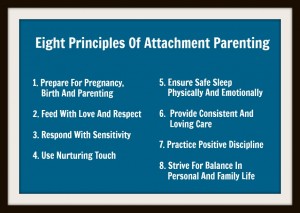 LISA REAGAN: So, I do want to talk about attachment science as it relates to mindfulness because what this is going to do is move us into the practical and guiding insights of the Eight Principles of AP (see graphic).
LISA REAGAN: So, I do want to talk about attachment science as it relates to mindfulness because what this is going to do is move us into the practical and guiding insights of the Eight Principles of AP (see graphic).
(If you’re listening to this now, you can go to your pass code protected retreat page and you can see the Eight Principles are presented there as the Wisdom Nuggets and you can also go to Lysa and Barbara’s book and find whole chapters on these Wisdom Nuggets to expand your knowledge and understanding of them.)
So, we’re talking about mindfulness as a state of self awareness and self regulation and I’m wondering now if we can just turn that corner into attachment science and connect those dots, which you kind of already are. Barbara?
BARBARA NICHOLSON: One of our eight AP principles is Responsiveness, responding with sensitivity to your baby, learning the language of love. This is the principle that runs through every one of our principles, because we’re really trying to develop that attunement and when you’re talking about regulation through meditation practices, we’re trying to help regulate our own emotional state. An infant needs the parent to regulate their emotions. They don’t have that capacity yet. They’re born so immaturely.
This is a huge disconnect in our culture – that we have a culture of young parents that are told in countless circles from their pediatrician to their neighbor, to their friend, to their mother-in-law that your baby is manipulating you, as if they are a little adult that can regulate themselves and others. It’s just a horrific myth. Where people are selling books about sleep training and letting your baby cry it out and disconnecting from their needs. This is probably the biggest disconnect and problem that we have in the United States, this mythology and inappropriateness of projecting adult consciousness onto infants.
When we can shift into the brain science and the attachment science, we understand how immature the human baby is, their brain is like 25% developed at birth. So they all have this premature brain and they’re really kind of little marsupials. They need to be in contact with their mother, their father, their primary care givers to help them regulate their big feelings, their big emotions, their needs. That is a huge gift to the world of psychology now that attachment research is just exploding in so many different disciplines.
It is really thrilling, the science, but unfortunately it really doesn’t trickle down to parents, you know, maybe for a generation or two, and we are losing these babies that are being ignored and left to cry to train them to sleep. It’s just, it’s a real tragedy in our opinion and one that I think any parent when they’re told about this, they are relieved to know that, “Oh, well, that’s why I can’t stand to hear my baby cry. That’s why I break out into a cold sweat, because I know it’s wrong.”
We’ve even seen sitcom episodes of parents that are pacing the floor and pulling their hair out because their baby is crying, but they are told, you know, ignore them and they will finally give up, which they do. So to turn that around into a more positive, “What we are promoting by encouraging mothers to breastfeed, by encouraging mothers and fathers to learn infant massage, to sleep safely with their baby in close proximity at night – if they can be within arm’s reach – and settle them and be responsive to them at night, really only helps the parent be relaxed and confident in their parenting because they’re relaxing more into their role and trusting their instincts are right.
Adults Teach Children By Example, But What Guides The Parent?
LISA REAGAN: I want to read this quote from your book. It’s by Albert Schweitzer and he says, “Adults teach children in three important ways. The first is by example. The second is by example and the third is by example.” So, Lysa, can you kind of expand on that? I think that’s just the direction we’re going in right now.
LYSA PARKER: Oh yes, and if I may just dovetail on what Barbara was saying. You had asked about the attachment research and how it’s related and Barbara mentioned Responding with Sensitivity. Some of the attachment research that we have in our book shows it is the more sensitive and reliable mothers who have securely attached infants and parents who are warm and positive with their children. There was a strong correlation with children’s development of infancy and social functioning, especially in older children. So there is a plethora of research on sensitivity as it correlates with the development of secure attachment, which is our goal.
So how do we get there? How do we develop that secure attachment? You just mentioned Albert Schweitzer’s quote, be an example basically, by example, so that puts it back on the parents. “Oh no, I’ve got to be an example to my child. I’ve got to walk the walk, not just talk it.”
So that goes back to Preparation. That goes back to mindfulness, you know, where we’ve got to address some of our own issues that we thought were kind of covered up or coped with. What neuroscience is telling us now is that we have fantastic coping mechanisms and we can go through life thinking, “No I am not going back in the past. I am not going to delve into those areas.”
We’re not talking about getting into real deep psychological issues. We’re just talking about reflecting on your childhood experiences and I remember the fact that my mother was raised in the South and she was a big spanker. That was the only tool she had, but she did much better than her parents who were very abusive, particularly her father. I remember one time she was being, I felt particularly mean to me and I said, “Mommy, when you were a little girl, did you say when you had children, you would be nice to your children?” and she just kind of looked at me.
I think that might have been a turning point for her, because I don’t think she spanked me after that. I was pointing out to her that she was not being a good example of what I needed as a little girl, and so we can’t just raise our children in the way that we’ve done for decades and for generations: “You do as I say, not as I do.”
And I think, again, going back to mindfulness, we have to have a goal. We need a goal in order to know where we’re going. I think too often we’re just flailing at this whole parenting business. If I hadn’t had La Leche League and Barbara as my support system, who knows where I would be today, but I had my support system, so it helped me focus on, “Okay, this is what I want for my children.”
When we talk about this in our book and in our curriculum, where parents reflect on what is it that you want for your child? What kind of characteristics do you want your child or your children to have? Okay, now that you’ve done that, how are you going to get there? Do you think, we don’t say this, but it’s not going to just magically appear because you want it to. We have to be active participants and going back to the principles, we think these are guideposts for all parents. We don’t call them the eight principles of attachment parenting. We say the Eight Principles of Parenting, because we believe these principles are the core of what children need for optimal physical, emotional, and cognitive growth.
And, you know, that reminds me of the argument of “good enough parents.” There is an argument, especially among academics, that if you’re just a good enough parent your kids are going to be fine. You know, that’s true, but to be a “good enough” parent takes a lot of work and I’m now saying that even though I am cofounder of API and we wrote this book and we’ve developed this curriculum. I feel like I was only a good enough parent because I have so much work to do and I’m still doing it with myself, but also learning along the way because there is so much to know, but at least I have guiding principles to help me along the way. So in anything, in any business, in any venture, you have to have a plan. I mean, we’re not saying you have to sit down and write your goals and your strategic plan necessarily, but just have a general idea of where you want to go and then surround yourself with a web of support of people who share those same values and that will help you in your growth. That will help you be an example to your children. So, does that answer your question?
LISA REAGAN: It does. Carl Jung says, “The ideal isn’t the destination, it’s the rudder.” Our ideal is our rudder. It helps us to get where we want to go. I think of the principles as exactly this rudder, as guidance. At least you have an idea what direction you want to go and this takes me back to, when I said that Albert Schweitzer quote, it occurred to me later, you know, I think I’d like to clarify that in the paradigms that we’re talking about here, if you’re in the old paradigm and you hear a quote like that, it can feel like a crushing pressure coming down on you as a parent to “figure this out.” You have to “figure out” how to dominate and control your child and there is this head game that is going to happen.
This is what I love about Attachment Parenting International, your life’s work, because when you’re moving into the principles the idea in the new story and according to science now is that we understand, this connection is already there. Joseph Chilton Pearce says he hates to talk about “bonding” because the bond is already there. We don’t really have to do it, we just have to bring a presence and awareness and mindfulness to this bond that exists and support it.
So when you are talking about the principles, it occurred to me that there is this feedback loop that’s happening here. That parents could potentially understand that the principles are guiding them in a way to relax into this bond and into this relationship with their child so that they actually get nurtured. So their stress levels are going down. So this idea of being “an example to your child” in the Old Story is being this dominator, authoritarian parent, you have to enter your head to “figure it out” on your own. How stressful is that? In the New Story, with the guidance of the principles, we’re relaxing into the present moment and into a relationship and we’re nurtured in return. So the example you provide as a parent is now a relaxed, connected, calmer, nourished parent.
How Community Nurtures The Parent
BARBARA NICHOLSON: The other component here is that the parent needs an example. So if we didn’t have an example, which most of us did not have perfect parents, that’s where the support groups come in.
LISA REAGAN: Right.
BARBARA NICHOLSON: That model is what API is based on is that parent to parent support, doing our best to be a mentor and an example to the best of our ability to young parents because they’re desperately needing to be nurtured themselves. That to me is the incredibly important component that you can’t get by sitting in front of your computer and reading about parenting. It is very important and helpful of course, but there is nothing like being around older, wiser parents and watching them interact with their children.
LYSA PARKER: Dr. Bruce Perry, he is a neuroscience researcher, started The Child Trauma Academy and he is the person that is called in for any kind of trauma that involves children, even Sandy Hook and Columbine. He goes around the country speaking about how important it is for us to nurture the human brain. He says as a culture, “We are neglecting our greatest biological gift” and that the brain is relational.
So you were talking about Joseph Chilton Pearce and the bond is already there. Well, yeah, it is there. And the brain seeks other brains and other human beings. So we are losing that from technology from the intrusion of technology. It’s a blessing and a curse, but definitely because it’s so new, we’re so infatuated with it, it is intruding into our lives and taking away those windows of opportunity for us to build those mirror neurons. We have mirror neurons that reflect off of each other and we pick up from each other our moods and our energy levels and sometimes we can even pick up thoughts of other people because we’re so in sync with our mirror neurons.
What Barbara touched on is really, really a concern for us. That parents, when they’re holding their babies, they’re checking their email. They’re checking their Facebook. Or they’re with their babies. You know, sure, they’re spending time with their babies, but they’re not being present. So that’s part of mindfulness is being aware when you’re overusing your technology and you’re spending too much time on your phone or on your computer or watching TV. So again, it goes back to our behavior and how we have to rein that in sometimes.
LISA REAGAN: I remember being a new mom and not having the internet and not having the information 17 years ago. So I am with you, but I did have a Families for Conscious Living group. I remember we carried our own FCL library books in the back of our car trunks and that’s how we got our information we desperately needed. So I’m very conflicted about this internet thing as well when it comes to parenting because the information that I was looking for back then was so hard to find.
Joseph Chilton Pearce’s books, for example, and he lived near us in Virginia! When I finally got online and found that Attachment Parenting International existed, it was just marvelous. It was wonderful. But I do need to share that I was a mother who had a very rough pregnancy and a very rough couple of months indoors in winter and when I first got to finally take my baby out, I think he was six or eight months old, and I went to my first FCL meeting, I remember wheeling up with my stroller, being all nervous, and I sat down in a group of probably 30 moms, on the ground in the park, and – I have told this story many times over the years. But, I turned away, all shy about nursing my baby. When I turned back around and finally kind of arrived in this circle of women, I watched them, marveled at them, being comfortable in their bodies.
Some of them were nursing toddlers and the toddlers would run across the circle and jump on their lap and lift their shirt and the moms didn’t miss a beat and they just kept talking to each other and passing snacks and – I have told everyone that has suffered listening to this story – that instant is when I became a mother. I did not know what it was to be a mother and I didn’t feel like a mother until I sat in that circle with these other mothers and even now, remembering what that felt like, I get kind of choked up. I felt like, oh my gosh, that was just incredible. I can’t get that on the internet. I couldn’t have that experience online.
LYSA PARKER: Exactly.
BARBARA NICHOLSON: Lysa and I will never forget the La Leche League meeting that we went to or where we met. You know, I can picture the meeting. It was just profound. It was my first La Leche League meeting in Nashville, Tennessee. I had just moved here from Texas and it was Lysa’s first meeting. So, it was exciting for both of us to be at our first meeting in Nashville and then for us to meet sitting on this couch. We discovered we had so much in common.
But I will never forget my first La Leche League meeting in Texas, before moving to Nashville, when I was pregnant and even though I did not have my baby yet, I just felt so relieved to be in this room with all of these other mothers and they were nursing and they were talking with their kids and I was just looking around the room kind of in shock as there was a nursing toddler and I had never seen a child nurse that old. And you know, I was not appalled, but just, taken aback. But still, it was just such a relief to be, picking up on the oxytocin levels.
You know, you’re responding to that. You’re responding to that heart energy going on and that attunement. I felt all of a sudden, “I’m a mother. This is what’s going to happen to me in just a few months. I’m going to have a baby in my arms and I can come here and I can learn.” And oh, what a joy that was. I will never forget it. That was 38 years ago.
LISA REAGAN: Wow.
BARBARA NICHOLSON: Unbelievable that my oldest is that old now.
LISA REAGAN: Wow, 38. I didn’t know.
BARBARA NICHOLSON: Yeah, yeah.
LISA REAGAN: I think 17 is a long time.
BARBARA NICHOLSON: Yeah. That’s such a profound event in a parent’s life, a mother’s life and a father’s life. You know, you’ll never forget that.
LISA REAGAN: David Bohm, the physicist, talks about this transmission of wisdom and insight when we are together in groups. You can find knowledge on the internet, but the wisdom I think has to be transmitted in person. The modeling is in person.
BARBARA NICHOLSON: I can remember coming to the meetings with my new baby or with a toddler and it made me want to be a better parent because I was being observed, you know. It’s almost like this thing that happens when you’re doing a documentary film. When you’re being filmed in a documentary, all of a sudden everyone’s behavior really becomes a little more aware. So being in a group does facilitate that. You are on your game. I know going to parenting conferences, like La Leche League, the afterglow would just go on for weeks and I knew I was a better mother because I had been around people that were setting such a good example. So it’s that ripple effect that we talk about so much, when we’re doing our API trainings. That the ripple effect starts in the individual family, and then it ripples out to your friends and your acquaintances and then the whole community benefits from that.
LISA REAGAN: Well, I feel like I need to say to anyone who is listening to this call to go to www.attachmentparenting.org and you can find a local API group if you want to connect with communities, go there now or after the call.
The Golden Rule Of Parenting: The Spiritual Essence Of Attachment Science
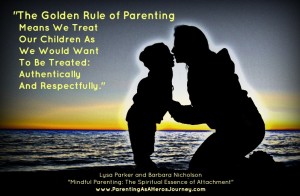 LISA REAGAN: So I wanted to move into this place that is in the back of your book and we want to take a moment and differentiate between religion and spirituality, but you do that in your book by pointing out that there is this core belief and the world’s major religions.
LISA REAGAN: So I wanted to move into this place that is in the back of your book and we want to take a moment and differentiate between religion and spirituality, but you do that in your book by pointing out that there is this core belief and the world’s major religions.
LYSA PARKER: Okay. I’ll be happy to. Well, we started looking at where this deep seeded belief in corporal punishment came from, right? And we talked with Bill and Martha Sears and they have some really beautiful ways of explaining the Biblical proverb “Spare the rod, spoil the child” is not a mandate to physically punish your children. They had a beautiful way of expressing that the rod was used to guide sheep and not to hit them.
This is what we call the Golden Rule of Parenting, it is the same Golden Rule that you find in all major religions that you want to treat your fellow brother and sister as you would want to be treated. In essence, it is one of the core tenants of the major religions and so we thought, well, it no less is relevant for children even though they’re not specifically addressed in some of these quotes, but it’s really at the core of attachment parenting.
It’s about being respectful. It’s about being empathic and being loving. I mean, whatever your religious persuasion, we probably can agree that God is one and you know, I personally don’t believe that there is a different God for every religion, but that God is love. I think that most of these major religions also speak to this tenant that God is love.
So every child born into this world is a gift from God. It draws out the spiritual and sacredness of the child and that relationship that you have with the child. I think it does begin with, as you were saying, Lisa, about relaxing into the relationship. It reminds me of what we used to say and mention in our book about falling in love with your baby. I just remember that – I’m sure I heard that at La Leche League meetings – that it’s okay to fall in love with your baby. That was really profound, because then you realize how uptight parents are because culture, in very subtle, insidious ways, is telling you not to do that. It’s telling you not to connect too much, don’t get too attached and mothers having to go back to work fast and tell their doctor, “I don’t want to get too attached because I have to go back to work.”
To have that kind of permission to fall in love with your baby, allows for that spiritual growth and relationship to develop. So, in essence, what we’re talking about, spirituality versus religion we’re really talking about recognizing that the child is love. That we are all representatives of that love of God and God is within us and that we need to be reflecting that in the relationship with our children. Does that make sense?
The Real Life Resources Of Attachment Parenting International
LISA REAGAN: You know, the title of this retreat sounds so high ground. It sounds like I’m going to have to stretch to get there. It sounds metaphysical, even. But I admit this was my ulterior motive all along, to explore the profound simplicity of what you’re saying. The simplicity and the practicality and the real core of it is exactly where you have led us to now, which is: mindfulness, or relaxing into the moment, attuning to yourself, attuning to your baby, is both a spiritual path and a well-developed science that supports human development, both the parent and the child’s.
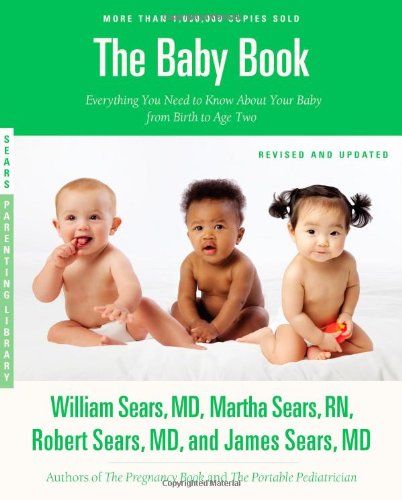
You both have been compiling the science and practical guides for attachment for over 20 years now. So parents do not need to flounder about, there is a well-marked trail head of where to start, even though the path of parenthood is always uniquely our own. These tools of mindfulness, and the book and its principles you have written, are comforting in their simplicity and groundedness. However, I think it’s important to acknowledge that where we end up on the other side of mindfulness practices and attachment insights can be some very high spiritual ground.
I know James Prescott has responded to your virtual retreat (to Kindred), by the way, by pointing out that the monkeys that he was responsible for as a researcher with the National Institutes of Health in the 70s and 80s showed very clearly that if they did not have the early attachment that they needed with their mothers that they couldn’t socialize later. Their brain development did not allow for that. Jim told Kindred his concern is that we don’t realize we also do not have access to our higher states of consciousness, such as spirituality, without the proper brain development made possible by proper attachment. Whereas the calm and peaceful community that he was looking for creating with primates was only possible when the milestones of attachment, responsiveness to the infants’ needs, were met. Prescott’s NIH work then and now shows this is the true for humans. This is the path to our own spiritual development.
This is also the path that we find laid out in the world religions through this core tenant and this is the path that we find in our brains through brain development and neurobiology. It is all amazing to me, but I would like to point out to parents – who have made it this far through your retreat – that what we really hope to do with Parenting As A Hero’s Journey is to help us move out of this Old Story that keeps us stressed out and disempowered and into our own New Stories, through compassion and awareness through mindfulness.
I am so grateful to both of you for taking this time to come here and to lead us through this frontier territory. It is fantastic that we’re at the end of this journey with our Fellowship of the Sling, ha, and we’ve covered an entirely newde paradigm of parenthood in three weeks!
BARBARA NICHOLSON: The science and the spiritual insights are there, but our culture is not. The challenges are that we have a culture that is not quite there yet. You have to find your tribe. You have to find your Fellowship of the Sling and then when you do, you are home. You are home. You are safe. You feel like “I can raise my children in a very difficult culture, now.”
But even if you just have one or two friends that are on this journey with you, that will be enough. Lysa and I and a couple of other really hard core moms that we’ve bonded to over the years, are still on the journey together with our adult children. We talk all of the time about our adult children and it’s fascinating to watch them mature and their relationships with others and they’re on their own journey. We feel great joy in the fact that we have such a close relationship with them. It’s not perfect, you know, and we talk about that all of the time too, but we feel very close and great friendships with our children have developed through the years.
LYSA PARKER: Well, just thinking about what you said, Lisa, and you’re a great interviewer and I appreciate the time that you’ve taken to talk to us tonight and to talk with us, but this whole mindfulness journey really is, it’s not just a blessing to our children, but it’s a blessing to ourselves, because it does empower us. It helps us find within us the voice of truth and I think that’s something that has been buried in most of us because of the way that we’ve been raised and the culture that suppresses us.
I want to also add that this is so much of a women’s rights issue to be empowered, to make decisions about our birth, to have choices for birth, to have choices in how we raise our children and as we talked about earlier, how deeply the rights of women and children are. So mindfulness on the surface and in one aspect is a very benign, nurturing aspect of our consciousness, but it leads to so many other more profound revelations in our life and in our culture.
We’re trying to get this message out about attachment parenting, our long term vision if we may be so bold, as Barbara mentioned earlier, is to see world peace and envision a world peace. If we can raise our children to… if we ourselves can be more compassionate and more empathetic and more sensitive and responsive to our children, which is really all we’re asking or trying to do, then we’re rewiring not only our children’s brains for the future and their genome, but for our grandchildren and beyond.
This vision is supported by a lot of the new science and genetic science and it’s just so exciting. So all of that to say, we need to start with small baby steps. Let’s just start with mindfulness for ourselves and in our relationship with our children and not to forget the other people in our family as well, other adults in our family. So it’s a life long journey. If you want to join us on that, we would welcome you with open arms.
LISA REAGAN: I would like for our listeners who have come this far with this to know how amazing your work is right now. You do have a curriculum and you do travel the road presenting this program. Just to brag on both of you for a moment, I know that you were in San Antonio presenting to professionals not long ago who were interested in translating your work for the Latino community. Both of you have master’s degrees and are amazingly qualified women for what you’re doing. I mean, you’re really out there in the trenches and I’m so very honored to know both of you and to have known you both for my entire parenting journey. Thank you both so much.
BARBARA NICHOLSON: Right, we have known each other for a long time.
LYSA PARKER: Thank you, Lisa, this has been a real joy for us because it’s not often that we can really have this different kind of conversation, using these principles in the realm of spirituality and mindfulness. It has been a real joy for us, thank you.
LISA REAGAN: Well thank you both very, very much. I do want to just mention one more time that everyone can go to www.attachmentparenting.org and you can find your tribe there. There are community groups all over the world that you can find right away and API has amazing supportive materials as well, which is always really important and of course you have Barbara and Lysa’s book, Attached at the Heart that you can find more information in there on the issues that we have talked about and those awesome principles. Thank you both again for coming along on Parenting as a Heroes Journey. This was an incredible journey. I am going to be listening to this one again.
Featured Image Shutterstock/RHIMAGE


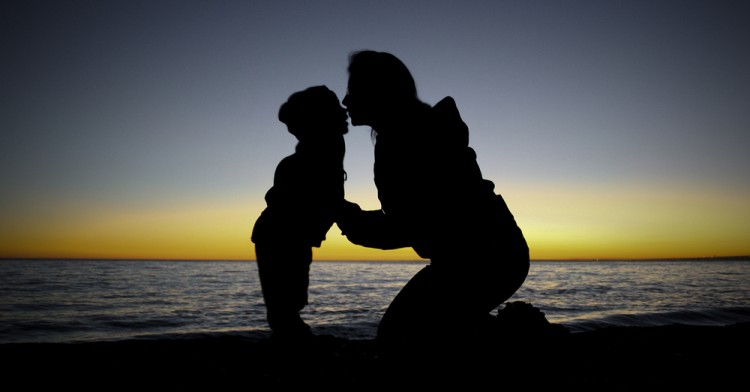
I’d like to mention Mindful Birthing: Training the Mind, Body and Heart for Childbirth and Beyond by Nancy Bardacke, CNM. http://www.mindfulbirthing.org/ Instructors are listed on the website.